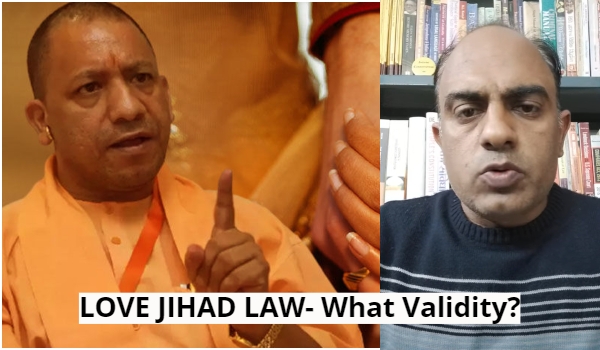Drowning people clutch at straw- How dare 'they' ask for validity of Love Jihad law?
Total Views |
New Delhi, January 08: Now that UP CM Yogi Adityanath has sought to protect the Hindu females of Love Jihad, how are 'they' going to bring off, right? So, in an update to the UP's law against Love Jihad, the Muslim scholars' body, Jamiat Ulama-I-Hind has approached the Supreme Court questioning validity of the said Ordinance promulgated to curb incidents of 'Love Jihad'. It claimed that the Ordinance 'attempts to regulate a personal decision of each human being by encroaching upon an individual’s choice to convert to a religion of his/her choice.'

In an impleadment application in the PIL by Vishal Thakre, the organisation contended that the scrutiny by the state of a personal decision was a grave assault on personal liberty of an individual and was violative of Article 21 of the Constitution. Apart from the Uttar Pradesh Prohibition of Unlawful Conversion of Religion Ordinance, 2020 and the Uttarakhand Freedom of Religion Act, 2018, state of Himachal Pradesh (Himachal Pradesh Freedom of Religion Act, 2019) has also enacted a similar legislation. A similar legislation is in the pipeline in Madhya Pradesh where the Cabinet cleared the Madhya Pradesh Freedom of Religion Bill 2020.
The organisation claimed that though Ordinance sought to address the mischief of forcible conversion, however it provided that reconversion to a person’s previous religion was not illegal, even if it was vitiated by fraud, force, allurement, misrepresentation and so on.
The Ordinance made it a criminal offence to convert a person by offering him or her an “allurement”, which had been defined very broadly to include even gifting of a book containing teachings of Islam, the application filed by advocate Ejaz Maqbool stated. It also pointed out no compelling circumstances have been brought forth by the state to justify using its emergency executive powers to promulgate the Ordinance.
Among other grounds, the organisation said the Ordinance interfered in the autonomy of the individual to make personal choices and imposed penal consequences even when the act of conversion did not affect the society at large. Further, the obligation to seek permission for conversion two months in advance was fundamentally arbitrary and a violation of the 'right to privacy'.
.
.

